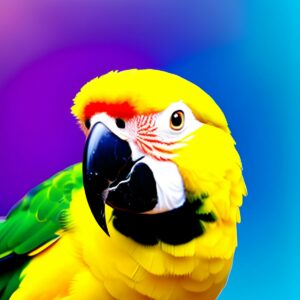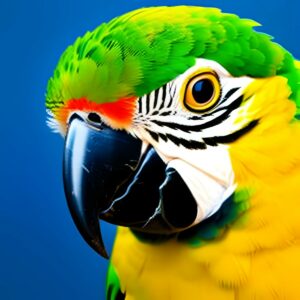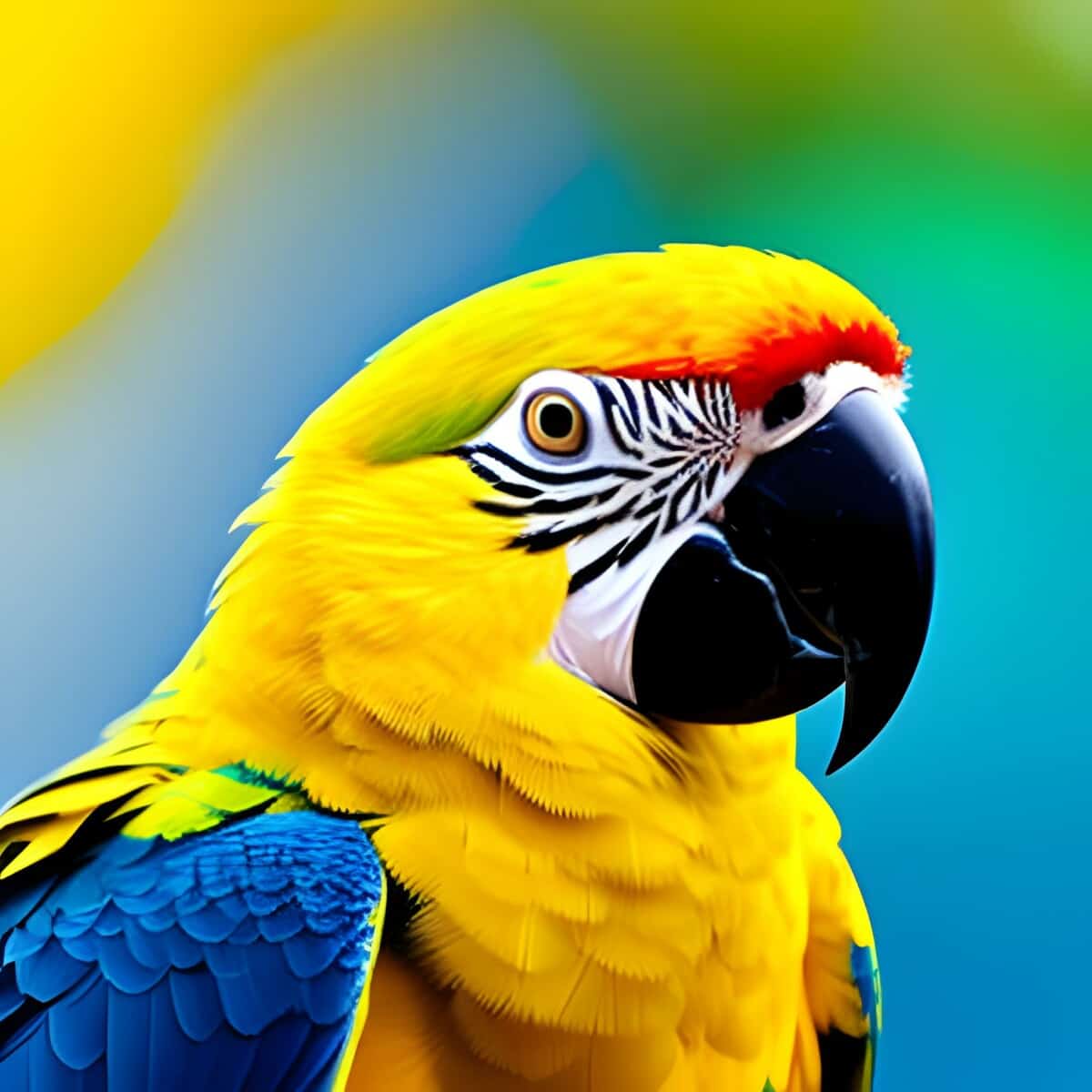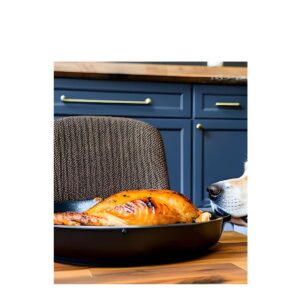There are over 5.7 million pet birds in the United States alone. This includes both indoor and outdoor birds and both captive-bred and wild-caught birds.
Senior bird parents need a community and support in caring for their feathery babies, this is where come in.
In this general guide, we will be talking about the foundations of caring for a senior bird.
We will include nutrition, environment, common health issues, and the emotional sides of caring for a bird.
Follow along and let’s get to it 🙂
Senior Bird Care: Table of Contents
At what age is a bird considered a senior

The age at which a bird is considered a senior can vary depending on the species and individual bird. However, generally, birds are considered to be entering their senior years around the age of 5-7 years for smaller birds such as budgies or canaries, and 10-15 years for larger birds such as parrots or macaws. It’s important to note that some birds can live well into their 20s, 30s, or even 40s, so it’s important to monitor their health and adjust their care as they age.
Physical changes in senior birds
Understanding the changes and adjusting your senior bird care accordingly can help ensure that your bird remains healthy and happy in their golden years.
Signs of aging in birds are:
- Feather color may fade or become duller
- Skin may become thinner and less elastic
- Muscles may weaken, leading to decreased mobility
- The immune system may weaken, making senior birds more susceptible to illnesses
- Organs may become less efficient, leading to reduced digestion and metabolism
- Behavioral Changes
- Senior birds may become less active and spend more time resting
- They may become less vocal and social
- Senior birds may be less interested in toys and other forms of enrichment.
- They may become more easily stressed or anxious
- Some senior birds may develop age-related cognitive decline or memory problems
Common health issues in senior birds
As birds age, they become more susceptible to certain health issues.
Here are some common health issues in senior birds:
Arthritis: senior bird’s joints can become stiff and painful, leading to arthritis. This can make it difficult for them to move around and may require special accommodations such as perches with padding.
Heart Disease: older birds may develop heart disease, which can manifest as labored breathing, lethargy, or difficulty flying. A veterinarian may recommend medication or changes in diet to manage heart disease in senior birds.
Digestive Problems: senior birds may have reduced digestive efficiency, which can lead to constipation or diarrhea. Providing a balanced diet with plenty of fiber and offering fresh water regularly can help prevent these issues.
Respiratory Issues: senior birds may be more prone to respiratory infections or breathing problems, such as wheezing or coughing. Keeping the bird’s living environment clean and avoiding exposure to smoke or other irritants can help prevent respiratory issues.
Tumors: aging birds may be more likely to develop tumors, which can be benign or cancerous. A veterinarian can assess any unusual lumps or bumps and recommend treatment options.
To care for an aging bird is to be vigilant about your senior bird’s health and to seek veterinary care if you notice any changes or concerning symptoms. With proper care and attention, many senior birds can continue to live happy, healthy lives.
Nutrition and Diet for Senior Birds

Here are some important considerations for the dietary requirements of senior birds:
Reduced Caloric Needs: older birds are often less active and require fewer calories to maintain a healthy weight. It’s important to adjust their diet accordingly to prevent obesity, which can lead to other health issues.
Increased Nutrient Needs: while senior birds may need fewer calories overall, their nutrient requirements may increase. Senior birds may require more protein, vitamins, and minerals to support their aging bodies.
Softer Foods: senior birds may have difficulty eating harder foods such as seeds or nuts. Offering softer foods such as cooked grains, fruits, and vegetables can make it easier for senior birds to get the nutrition they need.
Hydration: senior birds may be more prone to dehydration, which can lead to constipation and other health issues. Providing fresh water regularly and offering moist foods can help prevent dehydration in senior birds.
Supplements: older birds may benefit from supplements such as calcium or vitamin D, which can help support bone health. A veterinarian can advise on the appropriate supplements for your senior bird’s needs.
Best foods for senior birds

Providing a well-balanced diet is crucial to maintaining the health of senior birds. Here are some foods that are particularly beneficial for senior birds:
- High-Quality Pellets: are a great source of balanced nutrition for senior birds. Pellets offer a complete and balanced diet, and they can be an easier option for birds with dental issues.
- Cooked Grains: such as rice, quinoa, or oatmeal are a great source of easily digestible carbohydrates for senior birds. They can also be a good source of protein and fiber.
- Fresh Fruits and Vegetables: provide essential vitamins, minerals, and fiber for senior birds. Soft fruits such as bananas, berries, and melons are particularly easy for birds to eat. Vegetables such as sweet potatoes, carrots, and leafy greens are also good choices.
- Soft Foods: birds with dental issues may have difficulty eating harder foods. Soft foods such as cooked sweet potatoes, pumpkin, or squash can be a great option for these birds.
- Lean Protein: senior birds may require more protein than younger birds to maintain muscle mass. Lean sources of protein such as cooked chicken or turkey, boiled eggs, or tofu can provide this essential nutrient.
Provide a varied diet that includes a range of foods to ensure that senior birds are receiving all the nutrients they need to stay healthy. Consult with a veterinarian for specific dietary recommendations for your senior bird.
Environmental Factors and Housing
The environment and housing of senior birds can have a significant impact on their health and wellbeing. Here are some important factors to consider:
Temperature: older birds may be more sensitive to temperature changes and may require a warmer environment.
Lighting: full-spectrum lighting can help promote vitamin D production and prevent depression and other health issues.
Cage Size: senior birds may require a larger cage to accommodate any mobility issues they may experience. The cage should also be designed to minimize any fall risks.
Perches: providing perches with varying widths and textures can help prevent arthritis and other foot problems in senior birds. Soft, padded perches can also provide additional comfort. Padded perches provide additional comfort for senior birds, particularly those with arthritis or other mobility issues. Soft, padded perches can help alleviate pressure on their feet and joints.
Climbing perches provide exercise and stimulation for senior birds. These perches can be made from natural wood or rope and can be hung horizontally or vertically.
Cleanliness: keeping the bird’s living space clean is crucial for their health, as older birds may have a weaker immune system. Regular cleaning and disinfecting of the cage and surrounding area can help prevent infections and other health issues.
Enrichment: toys and other forms of enrichment can help prevent boredom and promote mental stimulation in senior birds. This can help prevent depression and other health issues.
Puzzle toys: such as foraging toys require the bird to work for their food or treats, which can help prevent boredom and promote exercise.
Shredding toys: birds love to shred and tear things apart. Shredding toys, such as paper or cardboard toys, can provide an outlet for this natural behavior.
Chewing toys: can help prevent boredom and keep senior birds’ beaks healthy. Safe options include toys made from wood, vegetable-tanned leather, or hard plastic.
Swing perches: can provide a fun and stimulating way for senior birds to exercise and play. These perches can also help prevent arthritis and other foot problems by promoting movement and flexibility.
Understanding the emotional needs of senior birds
Senior birds have emotional needs just like any other pets. As birds age, they may experience changes in their behavior and emotional needs.
Here are some things to consider when it comes to the emotional needs of senior birds:
Companionship: many birds form strong bonds with their owners or other birds. As birds age, they may become more dependent on their human or avian companions for emotional support.
Attention: senior birds may require more attention and interaction from their owners to maintain their mental and emotional health. Spending time with your bird each day, providing them with toys and stimulation, and talking or singing to them can all help keep them engaged and happy.
Routine: older birds may benefit from a predictable daily routine that includes regular feeding times, playtime, and social interaction. This can help them feel secure and reduce stress and anxiety.
Comfort: as birds age, they may become more sensitive to changes in their environment or routine. Providing a comfortable and familiar living space, including soft perches and cozy bedding, can help them feel secure and at ease.
Patience: senior birds may experience changes in behavior or physical ability, such as increased irritability or difficulty with mobility. Patience and understanding can go a long way in helping them feel safe and cared for.
Knowing when it’s time to say goodbye
Saying goodbye to a beloved pet is never easy, and knowing when it’s time to say goodbye to a senior bird can be particularly difficult. Here are some signs that it may be time to consider euthanasia for a senior bird:
Chronic pain: If a senior bird is experiencing chronic pain that cannot be managed with medication or other treatments.
Severe mobility issues: If a senior bird is unable to move around or climb properly due to arthritis, neurological problems, or other issues, their quality of life may be significantly reduced.
Loss of appetite or weight loss: Senior birds may experience changes in their appetite or lose weight as they age. If these issues cannot be resolved and the bird is not getting the nutrition they need, it may be time to say goodbye.
Breathing difficulties: Breathing difficulties can be a sign of serious underlying health issues, and if the bird is struggling to breathe or gasping for air, the quality of life is significantly reduced.
Loss of interest in life: If a senior bird is no longer interested in activities they once enjoyed, has stopped interacting with their owners, or seems to have lost their zest for life.
Ultimately, the decision to say goodbye to a senior bird is a personal and emotional one that should be made with careful consideration and in consultation with a veterinarian. It’s important to consider the bird’s quality of life and welfare above all else.
My Senior Paws is a participant in the Amazon Services LLC Associates Program, an affiliate advertising program designed to provide a means for sites to earn advertising fees by advertising and linking to Amazon.com. We also participate in other affiliate programs which compensate us for referring traffic.

